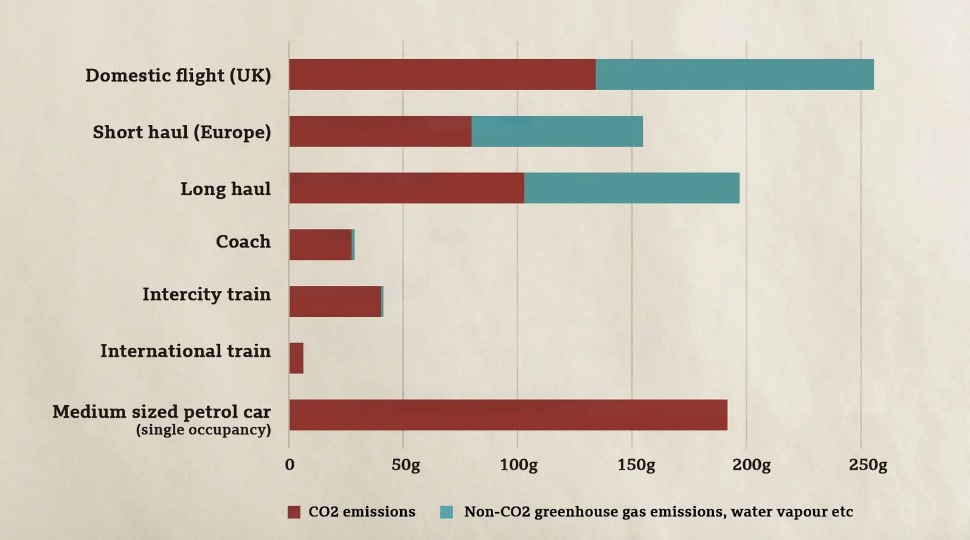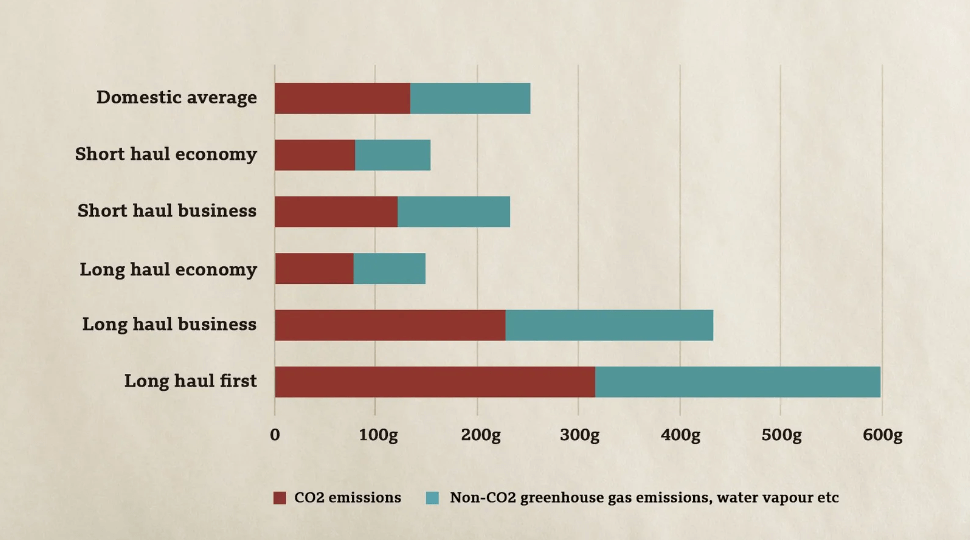Answer these simple questions and we will find you the BEST prices
Which type of solar quotes do you need?
It only takes 30 seconds
100% free with no obligation

Get up to 4 quotes by filling in only 1 quick form

Slash your energy bills by installing solar panels

For the average 2-3 bedroom house
- GreenMatch
- Blog
- Cancelled Flights CO2 Emissions
Cancelled Flights in the UK: Insights on CO2 Emissions

The aviation industry's carbon footprint is a significant concern, with CO2 emissions from flights contributing substantially to global greenhouse gas emissions. However, it's crucial to understand that reducing these emissions isn't as simple as cancelling flights. A more sustainable approach involves adopting greener travel practices, exploring alternative aviation fuels, and optimising flight routes for efficiency.
You might have already suffered from it or, at the bare least, read or watched it in the news: flight cancellations, airport delays, and cancelled holiday getaways are expected to continue throughout the entire seasons of the year.
As reported by the BBC, airlines are cutting tens of thousands of short-haul flights from their April-to-October schedule. The situation worsens in London, where most major British airports are. From an environmentalist point of view, this makes one wonder about the volume of CO2 emissions saved because of the cancellations. Short answer: quite a lot.
From January to March 2023, there were fewer flight cancellations, and more planes arrived on time at UK airports. The UK aviation industry has set carbon targets that will permit emissions from aircraft to rise to the mid-2030s, with the objective of the total carbon output being lower than the levels from 2019 via the purchase of carbon offsets.
To avoid misinterpretation, we are not promoting cancelling more flights to lessen CO2 and greenhouse gas emissions. Instead, we encourage the populace to take on a greener lifestyle by following practical green travel tips and reducing the number of flights they take.

The Impact of Cancelled Flights on CO2 Emissions
The effects of flight cancellations have far-reaching ramifications. Not only does it cause disruptions in travel plans, but it can also lead to financial losses and other disruptions. People who have booked flights may have to pay additional fees or find alternative modes of transportation. In contrast, those reliant on air travel may find themselves stranded in an unfamiliar place.
Furthermore, businesses that depend on air travel may incur losses due to cancellations, as they may be unable to meet their customers’ needs. It is, therefore, essential for airlines to take appropriate measures to prevent cancellations and minimize their impact on customers and businesses.
The environmental effect of grounded flights is more than just the CO2 emissions that are diminished during that period. It can also spark an understanding of the ecological implications of air travel among passengers and the travel business.
In August 2023, a glitch in the UK's air traffic control system, Nats, led to the cancellation of almost 1,600 flights in the nation's airports in one day and an additional 300 the following morning. Passengers were understandably disgruntled, though this disruption benefited the environment by decreasing CO2 emissions.
Approximately 32% of flights departing from UK airports are cancelled or delayed in the year's first five months. The CO2 emissions from the aviation fuels used in these flights amounted to around 40 million tonnes. This figure doubles when considering the return flights, leading to 80 million tonnes of CO2 emissions.
The UK has seen a significant decrease in domestic aviation emissions, with a 60% reduction between 1990 and 2021. This is partly due to measures implemented by the UK government to limit industrial, power, and aviation emissions in line with its commitment to achieving net-zero emissions. Despite these efforts, aviation still contributes significantly to the UK's emissions.
Aviation, however, is still a major factor in the UK's total emissions.
Flights in London, CO2 Emissions, Cancellations, and a Bit of Perspective
It may be helpful to look at how many flights arrive and depart from London daily to understand better how much CO2 and greenhouse gas emissions they produce.
On August 1, 2023, EUROCONTROL, a European aviation support organization, reported that 6,402 flights took off or landed in the UK. Of that total, 3,429 landed at the five main airports in London (Heathrow, Gatwick, Stansted, Luton, and City). The three airports that experienced the most cancellations, Heathrow, Gatwick and City, represented 68% of the total number of flights to or from London.
This added carbon footprint is equivalent to the annual emissions of approximately two million passenger cars.
Calculating the amount of CO2 released from flights in London is complicated, as it is determined by various components (e.g. length of the trip, type and size of planes, weight). Nonetheless, it is feasible to assess individual routes while considering these factors.
In 2019, The Guardian conducted a study demonstrating that even short-haul flights generate an immense amount of carbon dioxide, equivalent to the yearly output of many individuals worldwide. Even though the research was done three years ago, their interactive flight CO2 calculator is still useful.
For example, if one were to book a round trip from London to Rome, they would be responsible for emitting 234kg of CO2 per passenger. This is greater than the amount of CO2 the average individual in 17 countries globally produces in 12 months. Even a return flight from London to Edinburgh leads to 118kg CO2 per passenger, which is higher than the amount of CO2 the typical human in 10 countries produces yearly.
In 2022, British Airways announced a reduction of 10,300 short-haul flights from its schedule for August to October. If these flights were similar in length to the London-Edinburgh route, the avoided CO2 emissions per passenger would be around 607.7 tonnes.
This figure is the equivalent of 256 return flights from London to Jakarta or the amount of CO2 the average individual in 97 countries would emit in 256 years. It is interesting to note that 97 countries make up over half of the United Nations membership.
Greener alternatives
We do not wish you and your family to forfeit your summer vacation, which you have been planning for some time. Despite this, we urge you to consider the consequences of the current flight cancellation issue and how you can promote eco-friendly and sustainable travel as the standard.
According to Milena Buchs, Associate Professor in Sustainability, Economics and Low Carbon Transitions at the University of Leeds, travelling by train is likely far more climate-friendly than flying. “Generally, trains and coaches are the lowest carbon means of travel”, she says, as quoted by BBC Future in 2020.
The equivalent amount of carbon dioxide is released into the atmosphere for every kilometre a person travels via transportation.
The image below displays the CO2 equivalent emissions caused by different forms of transportation.
CO2 equivalent emissions for each km a passenger travels by means of transportation

Credit: BEIS/Defra/BBC
Dan Rutherford, who directs aviation and marine programmes at the International Council on Clean Transportation (ICCT), a non-profit organisation in the USA, has some advice on reducing emissions from flying. He suggests individuals follow his acronym NERD, which stands for New, Economy, Regular, and Direct when travelling by plane. This is a way to make air travel more eco-friendly.
Level of CO2 equivalent produced by each km a passenger travels by cabin class

Credit: BEIS/Defra/BBC
Sustainable travel practices
Beyond the impact of individual flights, promoting broader sustainable travel practices is important. Reducing one's carbon footprint through eco-conscious travelling and supporting green travel initiatives can significantly impact. For example, choosing direct flights, flying in more fuel-efficient aircraft, or opting for alternative modes of transportation can all contribute to a more sustainable travel industry.
Aviation industry in reducing Emissions
The aviation industry plays a pivotal role in reducing greenhouse gas emissions globally. With aviation being one of the fastest-growing sources of emissions, there is a pressing need for the industry to adopt sustainable practices. Innovations such as Sustainable Aviation Fuels (SAF), electric and hydrogen aircraft, and eco-friendly travel practices are at the forefront of this transformation.
The industry's commitment to these initiatives is crucial for achieving significant emission reductions. For instance, SAFs can potentially reduce CO2 emissions by around 80% compared to traditional jet fuel.
However, it's important to reiterate that reducing CO2 emissions through flight cancellations is not a long-term solution for reducing greenhouse gas emissions. The aviation industry and individuals must adopt greener travel practices, such as reducing the number of flights they take and exploring sustainable aviation fuels (SAF) and electric and hydrogen aircraft.
Though not a replacement for the progress of sustainable aviation operations -- such as employing and refining Sustainable Aviation Fuels -- the suggestions above can be used in the short term. The decision is yours. We are pleased that by reading this article, you are already considering ways to make your next flight more eco-friendly.
The current trend is that people are beginning to understand the value of caring for the environment and implementing ways to reduce waste. It is becoming increasingly apparent that individuals, businesses, and governments must reduce the amount of waste they produce and find ways to reuse and recycle. A greater appreciation for the environment is quickly developing, and people are starting to recognize the importance of taking action to protect it.

Luis Antonio is a seasoned Content Writer with international journalism experience. His writing style, enriched by a Master’s in Journalism, contributes informative content to GreenMatch on topics including low-carbon heating systems.
We strive to connect our customers with the right product and supplier. Would you like to be part of GreenMatch?

